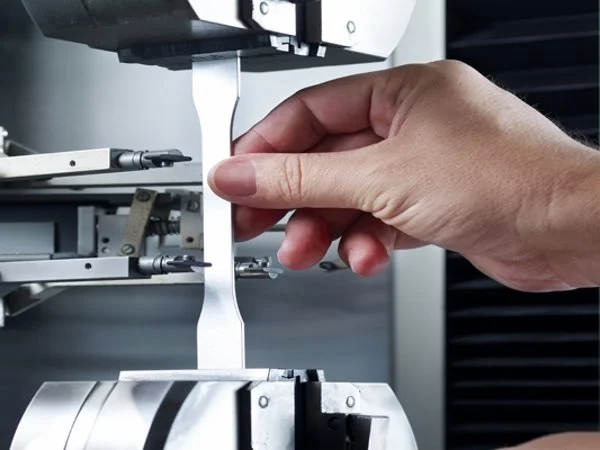API 5L Steel Pipe Mechanical Property Testing
The API (American Petroleum Institute) 5L specification governs the manufacture of line pipe used in oil and gas production systems. This standard ensures that pipes are capable of withstanding high-pressure, high-temperature conditions while being structurally sound. The mechanical property testing for these pipes is crucial to ensure compliance with stringent industry standards.
Our laboratory specializes in a comprehensive range of mechanical tests designed to evaluate the properties of API 5L steel pipe. These tests include but are not limited to tensile strength, yield strength, elongation, reduction of area, and impact testing. The results of these tests are essential for quality assurance and compliance with international standards.
The process begins with careful sample preparation according to industry best practices. Samples must be free from defects such as cracks, porosity, or inclusions that could compromise the integrity of the pipe during service. Once prepared, samples undergo various mechanical tests using state-of-the-art equipment:
- Tensile Testing: This test measures the maximum stress a sample can withstand before failure. It is critical for determining the ultimate tensile strength (UTS) and yield strength of the steel.
- Yield Strength Testing: This evaluates the material's resistance to plastic deformation without fracturing. The yield point indicates how much strain the pipe can handle before it starts to permanently deform.
- Elongation Testing: This test assesses the ability of a metal to elongate or stretch under tensile load until failure. It provides insights into the material’s ductility, which is essential for flexibility and adaptability in high-pressure environments.
- Reduction of Area Test: Similar to elongation but focuses on how much cross-sectional area reduction occurs during testing. This helps determine the amount of necking that happens before a sample fails.
- Impact Testing: This evaluates the toughness of the steel by measuring its resistance to impact loading. It is performed using notched samples subjected to specified energy inputs.
The equipment used for these tests includes high-precision universal testing machines and specialized notching tools for impact testing. All instruments are calibrated regularly to ensure accurate results that meet international standards such as ASTM E8, ASTM E23, and ISO 6892.
After completing the mechanical property tests, our laboratory generates detailed reports that document all test parameters, procedures, and results. These reports include graphs of test curves for visual representation and are accompanied by compliance statements affirming that the tested specimens meet the requirements set forth in API 5L specifications. This ensures transparency and traceability throughout the entire testing process.
Understanding the critical role these tests play in ensuring safety and reliability within the oil and gas industry is paramount. By adhering to rigorous testing protocols, we contribute significantly to maintaining high standards of quality control across all stages of pipeline construction and maintenance.
Industry Applications
API 5L steel pipes are widely used in various sectors within the oil and gas industry due to their robustness and durability. Here are some key applications:
- Pipeline Construction: These pipes form the backbone of onshore and offshore pipeline networks, transporting crude oil and natural gas over long distances.
- Refineries and Processing Plants: They are used in various refining processes where high-pressure containment is necessary.
- Offshore Platforms: In deep-sea environments, these pipes ensure the safe transfer of hydrocarbons from production wells to platforms or vessels.
- Petrochemical Plants: They play a vital role in handling corrosive fluids and gases during chemical processing.
- Surface Facilities: These include gathering stations, metering points, and storage tanks where these pipes are used for fluid transfer between different components of the facility.
Each application demands specific mechanical properties from the steel pipe to ensure longevity under harsh conditions. Our testing services help manufacturers and operators meet these stringent requirements, thereby enhancing operational efficiency and safety in critical infrastructure projects.
International Acceptance and Recognition
The API 5L specification is internationally recognized as a benchmark for quality in the production of line pipe used in oil and gas applications. Compliance with this standard ensures that pipes are suitable for use under severe conditions, which is particularly important given the diverse operating environments in the global oil and gas industry.
Our laboratory adheres to these standards meticulously, ensuring that every test conducted aligns closely with API 5L requirements. This includes using appropriate test methods outlined in relevant international standards like ASTM E847, ISO 6306, and EN 10217-1.
The acceptance of our testing results by regulatory bodies and industry stakeholders further strengthens the credibility of our services. Many major oil companies, pipeline operators, and governmental agencies rely on these tests to verify that their materials meet the necessary performance criteria. This global recognition underscores our commitment to delivering accurate, reliable data that supports informed decision-making processes.
Environmental and Sustainability Contributions
In an era where environmental responsibility is increasingly important, API 5L steel pipes contribute positively to sustainability efforts through their durability and longevity. By ensuring the integrity of these pipes, we help minimize leaks and spills that could otherwise harm ecosystems.
The robust design of API 5L pipes allows them to operate efficiently over extended periods without replacement, reducing the need for frequent maintenance activities which consume resources and generate waste. Furthermore, by adhering strictly to mechanical property testing protocols, we ensure that these pipes perform optimally under extreme conditions, thus extending their useful life.
This focus on sustainability extends beyond just the products themselves; it encompasses the entire lifecycle of a project involving API 5L steel pipes—from procurement through installation and operation. Our laboratory plays an integral role in this process by providing accurate test results that guide decisions towards more sustainable practices.





